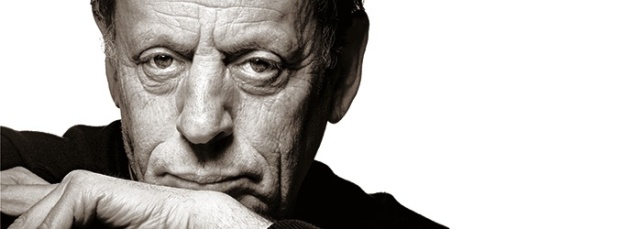Philip Glass disliked much of the dissonant music that was championed by the Second Viennese School and their followers in the European avant grade. He was much more attracted to the emerging minimalist style of fellow American composers like Terry Reilly and Steve Reich and he was also heavily influenced by the repetitive and hypnotic ragas he heard while visiting his friend Ravi Shankar in India in the 1960’s. From these two influences emerged the quite tonal arpeggios which were to become the signature of Glass’ music.

Philip Glass.
Glass was not only a composer of orchestral music and to date has composed 14 operas 3 of which he has called his ‘portrait series’. These are operas about great men who have affected the course of human history. Firstly Albert Einstein in Einstein on the Beach, Mahatma Gandhi in Satyagraha and finally the Egyptian Pharaoh Akhenaten in Akhnaten (for some reason Glass dropped the first ‘e’). Each man in turn greatly influencing the history of humanity in the areas of Science, Politics and Religion respectively.
For a modern opera Akhnaten which had its premiere in 1984 is a very accessible work and is not as starkly minimalist as some of Glass’ music. It is certainly an opera for those who may like listening to the classic repertoire and would like to dip a toe into some more modern work without being scared off by excessive percussion, atonality or dissonance. The music in much of Akhenaten is seductive and at times incredibly beautiful and lyrical. Akhnaten is musically even more accessible to those who listen to more modern popular music because it has a strong rhythmic element which tends to be absent from most of the operatic canon. If you are of the opinion that opera is long beyond its sell-by date, and there are a few who hold this opinion, then best avoid this piece altogether and stick to Nessun Dorma.

Image of Akhenaten and Nefertiti found at Amarna in 1881.
The opera opens with the funeral of Akhnaten’s father the Pharaoh Amenhotep III and the ascension to the throne of his son who then takes Nefertiti as his queen. He then stuns one and all by announcing that he is to abolish the old religion of the ancient gods of Egypt and institute a new one where there is only one God. Aten shall be the new and only deity and Akhnaten shall be his intermediary on earth. You begin to see now why Glass found the story of Akhnaten so interesting and worthy of his musical attentions. He was the first person in documented history to establish a monotheistic religion and there is a school of thought that all monotheistic religions like Christianity, Judaism and Islam flow from Akhnaten’s founding idea.

Akhenaten, Nefertiti and their children with the god Aten shinging down on them, and a statue of Akhenaten.
Banishing the old priesthood from their temples he installs belief in Aten as the only true religion. He then proceeds to move the royal capital from Thebes to the new city of Akhetaten (Horizon of the Aten) which he is building from scratch further north along the River Nile. This idea of the Pharaoh turning his back on the ancient gods deeply offended the priesthood and followers of the old religion who spread discontent about the new king who by now has moved with his followers to his new capital city. There he shuts himself and his family away in his new palace to worship Aten and presumably to ruminate on his new found position as intermediary between God and mere mortals.

Anthony Roth Costanzo as Akhnaten for English National Opera.
Well I suppose it wouldn’t be an opera if it didn’t end in tears and eventually his people rise against Akhenaten killing him and all his family, destroy his city and return to Thebes to reinstate the old traditions and gods. The opera ends with modern day tourists walking through the ancient ruins of Akhetaten as the ghosts of Akhnaten and his family wander amidst the sand and stones.
There are a number of intriguing things about this opera. Firstly the work is scored for an orchestra with no violins. The story goes that the Stuttgart State Opera where the premiere was meant to be held was being renovated so the Stuttgart State Theatre was used instead. The orchestra pit was too small so Glass just dropped the violins and rescored the music. Another intriguing point is that the narration is spoken in the language of the audience while most of the opera itself is sung in Egyptian, Akkadian (an ancient language from Mesopotamia) and Hebrew. Finally and very oddly for a modern opera the lead role is written for a countertenor, the highest of male voices. Akhnaten’s queen Nefertiti is cast as a mezzo soprano and in their duets she actually sings lower than him.

There are a number of recordings of this work circulating and the one I have is one with most of the original Stuttgart cast conducted by Dennis Russell Davies with the Stuttgart Opera Orchestra in 1987. This is one of those rather off-kilter operas that you trip across now and again that turns out to be an absolute gem. The more I listen to it the more its beautiful music grows on me. I highly recommend listening to Akhnaten and indeed looking into the whole story of this utterly fascinating Pharaoh.
English National Opera presented a new production of Akhnaten earlier this year and LAOpera open their production run on November 10th this year.

You mention that you have seen recordings other than the Sony Masterworks Stuttgart one. I have not seen any other recordings of this, my favorite opera; would you be able to elaborate? Thanks very much.
LikeLike